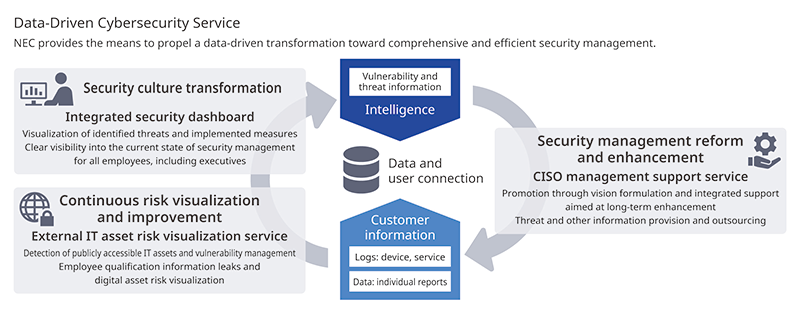Global Site
Breadcrumb navigation
Cyber Security


NEC’s Cybersecurity Strategy
NEC addresses intensifying cyberattacks and responds to legislative changes geared toward enhancing cybersecurity, leveraging intelligence and AI to contribute to efforts to "MAKE JAPAN CYBER SECURE".
With the expanding use of cloud services and rapid digital transformation (DX), the systems and data that companies need to protect are increasingly dispersed both inside and outside the organization. This has led to complexed IT environments. As a consequence, security risks can remain hidden throughout the company, making it easier for incidents to occur and for damage to spread. Furthermore, cyberattacks and cybercrimes are harder to see compared to crimes or attacks in the physical world, making it difficult to grasp or the current situation and the level of to what extent countermeasures that have been implemented.
In order to respond to these circumstances where the safety of cyberspace is being threatened and business continuity is increasingly at risk, and to promote DX in a safe, secure, and sustainable manner, it is necessary to visualize cybersecurity risks from a management perspective. NEC offers the Data-Driven Cybersecurity Service (DDCS), which analyzes and visualizes risks based on actual data (data-driven), and it is used by customers in their security risk management.
However, the situation surrounding cyberspace continues to worsen. The "10 Major Security Threats 2025 [For Organizations]," includes "cyberattacks stemming from geopolitical risks" for the first time. The report highlights the existence of nation-states that conduct cyberattacks with the aim of causing social disruption toward politically adversarial neighboring countries, and clearly states the necessity for organizations to continuously strengthen their countermeasures against such attacks from these nations.
In light of these changes in social circumstances, the Japanese government is accelerating its efforts to bolster the response capabilities of both the public and private sectors in the field of cybersecurity.
In response to the government efforts to enhance the cybersecurity framework, NEC is also developing new services and technologies to "MAKE JAPAN CYBER SECURE," protecting the cyberspace of both the Japanese government and the private sector. To respond to increasingly sophisticated cyberattakcs, including emerging new methods, it is necessary to quickly collect and analyze large amounts of intelligence and implement countermeasures. This type of intelligence is highly confidential information. As part of the public-private collaboration in the field of cybersecurity, it is expected that such intelligence will be shared with government organizations. Given the situation, such information must be handled with an adequate level of care. NEC aims to "MAKE JAPAN CYBER SECURE" with Japanese technology building on its longstanding track records of ensuring the safety and security of Japan by supporting Japan’s critical infrastructure, including submarine cables, aerospace and national security operations, and mission-critical systems. By leveraging proprietary intelligence and cotomi, NEC's generative AI, we will combine AI with cybersecurity technologies to expand its cybersecurity business globally. In order to "MAKE JAPAN CYBER SECURE" including protecting Japanese companies operating overseas, NEC will contribute to the realization of a safe and secure information society.
Support NEC Can Provide
While many companies are taking steps to improve their cybersecurity, security incidents and their impact continue to rise. The number of ransomware cases has increased approximately fivefold since the second half of 2020, affecting organizations of all sizes and threatening business continuity. This growing threat can be attributed to the rapid advancement of digital transformation (DX) and the expanding use of cloud services, which have caused critical systems and data to become increasingly dispersed across internal and external environments. Because the assets that need protection are distributed, security measures tend to be locally optimized, making it difficult to achieve overall effectiveness. Furthermore, as systems become more complex, it becomes difficult to consider the entire process from introduction to operation when implementing measures. The repeated fragmentation of the implementation-to-operation process and the recurring local optimization of countermeasures create latent security risks at the company-wide level, making it easier for incidents to occur and for the damage to spread. In recent years, from the perspective of economic security, there have been moves to impose obligations to ensure safety in corporate security measures and to clarify management responsibility. When security risks remain latent, it is difficult to say that appropriate measures are being implemented across the organization, which can lead directly to challenges in management, investment decisions, and corporate governance. To eliminate latent security risks and visualize cybersecurity risks from a management perspective, it is important to continuously understand what is happening across the entire system and the extent to which countermeasures have been implemented. To achieve this, NEC has developed an original cybersecurity dashboard that visualizes the necessary data for system administrators, employees, and executives. This enables data-driven security risk management and practical cybersecurity management. Drawing from the knowledge we have accumulated through building and operating our in-house cybersecurity dashboard, NEC provides its Data-Driven Cybersecurity Service (DDCS) to customers, supporting the realization of digital transformation in security operations.


Technology, Research, and Business Development to MAKE JAPAN CYBER SECURE
NEC leverages AI technology to enhance and streamline the processes to "build systems correctly," "maintain stable operations," and "protect against attacks," thereby safeguarding social infrastructure and organizations against the threat of cyberattacks.
AI Agent for System Risk Diagnosis currently under development analyzes intelligence information in place of humans and translates it into general attack knowledge information entailing what kind of attacks can be carried out under what conditions and what will result. This makes it possible to assess the impact of newly reported threats and vulnerabilities on systems, and to formulate effective countermeasures.
AI Agent for Guideline Checking can, for example, generate contextual information (such as methods for interpretation) to bridge the gap between the general wording of guidelines and the specific descriptions found in actual system documents. The AI can then autonomously identify relevant sections in design documents that correspond to checklist items, and determine whether requirements are met.
AI Agent for Information Security Internal Audits enables us to aim to reduce the time required for audits, enhance report quality, and achieve greater consistency by combining AI with auditors. Moreover, utilizing NEC’s industry-specific expertise, it is possible to generate tailored recommendations for each industry.

To learn more about NEC’s approach to cyber security, please download “Cybersecurity Management Report 2025”
Contents
- MAKE JAPAN CYBER SECURE
NEC's Information Security Report
- Information Security Promotion Framework
- Information Security Governance
- Information Security Management
- Information Security Infrastructure
- Information Security Personnel
- Measures Against Cyberattacks
- Information Security in Cooperation with Business
- Providing Secure Products, Systems, and Services
NEC’s Frontline in Information Security
- NEC’s Cybersecurity Strategy
- Support NEC Can Provide
- Technology, Research, and Business Development to "MAKE JAPAN CYBER SECURE"
- Third-party Evaluations and Certifications
- Overview of NEC Group
Case Studies

 Japan International Cooperation Agency (JICA)Enhancing cybersecurity capabilities in ASEAN through joint cyber defense exercises
Japan International Cooperation Agency (JICA)Enhancing cybersecurity capabilities in ASEAN through joint cyber defense exercises
 KOSEN (College of Technology)KOSEN and NEC team up to deliver high-quality cybersecurity education
KOSEN (College of Technology)KOSEN and NEC team up to deliver high-quality cybersecurity education
 NEC GroupSafeguarding data, empowering societies with NEC Group
NEC GroupSafeguarding data, empowering societies with NEC Group KAJIMA CORPORATIONRaising cybersecurity standards across an entire global organization
KAJIMA CORPORATIONRaising cybersecurity standards across an entire global organization
NEC Security Blog
Engineers from the NEC Security Engineering Center provide technical topics related to cybersecurity.

News
- Oct 3, 2025
- Press Releases
- Sep 5, 2025
- Press Releases
- Oct 11, 2024
- Press Releases
- Oct 11, 2024
- Product Introduction
